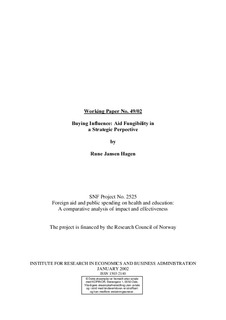| dc.contributor.author | Hagen, Rune Jansen | |
| dc.date.accessioned | 2006-07-18T12:30:45Z | |
| dc.date.available | 2006-07-18T12:30:45Z | |
| dc.date.issued | 2002-01 | |
| dc.identifier.issn | 1503-2140 | |
| dc.identifier.uri | http://hdl.handle.net/11250/165774 | |
| dc.description.abstract | I study equilibria of non-cooperative budgetary games between an aid donor and a recipient when there is conflict over the preferred allocation of the combined budgets of the two parties. I show that final outcomes are the same in the Nash-equilibrium of the game as well as in the equilibria of the two possible sequential games. The game-theoretic approach to aid fungibility is contrasted with the traditional non-strategic approach. I argue that in order to understand the issues involved, the former is superior to the latter as it derives final allocations instead of assuming them, and thus enables one to analyse the sources of influence over outcomes. | en |
| dc.format.extent | 336075 bytes | |
| dc.format.mimetype | application/pdf | |
| dc.language.iso | eng | en |
| dc.publisher | SNF | en |
| dc.relation.ispartofseries | Working Paper | en |
| dc.relation.ispartofseries | 2002:49 | en |
| dc.title | Buying influence : aid fungibility in a strategic perspective | en |
| dc.type | Working paper | en |
